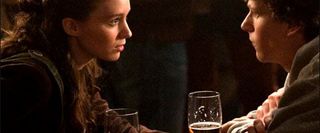Oscar Take Note: The Social Network Is Both Annie Hall And Star Wars

[note: Our ongoing series of Oscar Rants continues with Mack's take on Best Pic nominee The Social Network. Watch for more Oscar Rants coming soon. Here's Mack…]
There is a fundamental problem at the core of the Academy Awards. It’s not really talked about often, but it’s none the less ever-present. There is a disconnect between entertainment and greatness. For the purposes of this article, let’s call it the 1977 predicament because that’s the clearest and most relatable example. At that particular Oscar ceremony, the Best Picture race featured Annie Hall going up against Star Wars. There were, of course, three other candidates, but let’s just ignore them and hone in on these two. Annie Hall was the critic’s darling. Experimental and smart, it redefined the rules for romantic comedies. It broke the fourth wall. It featured cameos, brilliant acting performances and grand social commentaries on the two most famous American cities. Conversely, Star Wars was every bit as straight forward as Annie Hall was subtle. It was grandiose, maybe a bit clichéd and a whole lot of fun. Of course Woody Allen’s film took home the Oscar, and to this day, it’s still talked about and played on movie channels the world over, but it doesn’t compare to the phenomenon that is Star Wars. Almost a dozen of its characters are part of the cultural lexicon. It’s inspired five live action sequels/ prequels, billions of dollars in merchandise sales and a complete reimagining of special effects. Annie Hall may have won the Oscar, but did it actually win the war?
No, it didn’t. It eventually lost because Star Wars is simply a more entertaining movie. It’s had a greater cultural impact because people are more often in the mood to watch Han Solo rather than Alvy Singer. Annie Hall may have loftier goals and subject matter, but its technical proficiency only slightly surpasses Star Wars. Once you factor in entertainment value, it’s not even really a contest. Star Wars is the film we all remember from 1977, and in thirty-three years, it’ll be The Social Network from this year’s crop of Academy Award nominees that we’re all still be talking about. It’ll win the war. I’m positive of that, but if it loses in the interim, it’ll be a travesty. Whereas the Star Wars and Annie Hall debate is still wrestled with today, one technically better, one more entertaining, The Social Network far surpasses all other Best Picture nominees on both measures. It’s the ideal combination of greatness and entertainment value, and as such, it should run away with Best Picture. It’s Annie Hall and Star Wars.
The Social Network is perfect. There is not one camera angle out of place nor excess word delivered. Like Secretariat at the Belmont Stakes, it moves like a tremendous machine, each line setting up the next, each interwoven story perfectly intersecting with its counterpart. For such a morally ambiguous premise, the film is remarkably succinct. It pauses in the gray areas but never comments, letting viewers decide for themselves whose actions were inappropriate. It would be easy to credit screenwriter Aaron Sorkin alone with this technical brilliance, but really, he’s one masterful solution inside the larger set. Director David Fincher understands his characters. He knows when to cut them off and when to let them bloviate. His use of back-and-forth is particularly brilliant, as seen in the creation of Zuckerberg’s hotness website facemashed against the exclusive party. It might seem like self-gratifying schizophrenia the first time through, but it’s actually a great way to keep the hopes, wants and dreams of each character straight.
There are nearly ten plot essential characters here, each delicately handled by his or her actress. Jesse Eisenberg is the presumptive second place to Colin Firth. Andrew Garfield was nominated for a slew of other awards, and frankly, Armie Hammer may have been better than both of them. Still, it could be argued these men aren’t even the film’s greatest acting strengths. Every principal and non-principal support is perfectly cast. Take each man’s lawyer or Eduardo’s girlfriend or President Larry Summers. Have you seen an interview with the real Larry Summers? He looks and sounds exactly like that. Yet, actor Douglas Urbanski’s performance is no more memorable than anyone else’s. That’s precisely why so many were excluded from the Academy acting categories. Who’s to say Armie Hammer is better than Justin Timberlake who’s better than Andrew Garfield who’s better than Rooney Mara? They’re all very good, willing to sacrifice their own home runs for routine doubles that keep the batting order going. You can’t say that about Black Swan and you certainly can’t say that about The Fighter.

And then there’s the score. Trent Reznor and Atticus Ross’ musical work is nothing short of stunning. Each piece jars against the action, butting heads and creating a lingering sense of tension that hints at the underscored hostilities. Let’s for a second forget that this score was responsible for the Henley Sequence, the single greatest scene filmed this year. Is it too much to assume the pair’s work still would have been unmatched? Listen to the haunting piano in the title sequence and get back to me.
That, in a wall post, is why The Social Network is the Annie Hall of the nominees, but it’s also the Star Wars. The comparison may seem ludicrous on the outset, but let’s delve a little deeper. That’s what both The Social Network and Star Wars are about anyway. Each is a reasonably simple to understand story. Each has a ton of very good acting performances but few with the outward dazzle to win Best Actor or Actress. More importantly, each is a product of exactly what you put in. You can watch The Social Network paying half attention and understand the general ins and outs. Mark Zuckerberg latched onto an idea that may or may not have been his. He turned it into an empire, pissed a lot of people off and became the youngest billionaire in the world. That’s the story. It doesn’t take brains to follow it, but to accurately understand the complexities of how it happened and why, you must pay careful attention, listen to the side characters and pour over the algorithms. Every little formula here adds up, it’s just a question of whether you take the time to notice. The Social Network caters to both the casual fans and the obsessives, exactly like Star Wars and in doing so, creates a final product that can be cherished by both.
CINEMABLEND NEWSLETTER
Your Daily Blend of Entertainment News
Further, The Social Network has the perfect number of laughs for a dramatic film. From Zuckerberg’s asshole “let me check your math” comment to the hysterical animal cruelty aside, the film knows exactly when to lighten the mood. Best of all, the jokes are all plot-oriented. They’re not foolish asides or obvious attempts at comedy, they’re highlights of the absurdities relevant to each character’s personality. Why is the chicken story there? It comes up later in the lawsuit and shows just how low both sides are willing to sink. Why don’t any of the character’s laugh when one of the Winklevi says he’s six-five, two twenty and there’s two of him? Because that’s precisely the type of comment a twin would be comfortable saying in that situation. The same goes for Zuckerberg’s math skills or asking for recognition from the board. These are funny moments, but they’re funny in the same way real life is funny.
You could say the same thing about the film’s pacing. Most Best Picture nominees are arduous to get through. They linger to develop characters, to bask in the quiet moments. There’s nothing wrong with that in terms of quality, but for repeat viewings, it can really drag out. Not so with The Social Network. It’s chaotic and fast-paced; yet, a lot of the time, there’s nothing really going on. People spend entire scenes in this movie coding, but because of the pacing, it’s never a chore to get through and never seems more frenzied than real life.
There is a fundamental problem at the core of the Academy Awards. As a result, voters almost always have to choose between entertainment and quality. Sometimes, like in the case of The Dark Knight, a very good, incredibly entertaining movie doesn’t even find itself nominated, but this year, as was the case with The Departed and American Beauty, there’s no divide. The Social Network is Annie Hall and Star Wars. Someday, it’ll win the war. It’ll be the 2010 movie everyone thinks of. Let’s hope it wins the Oscar in the meantime.
[Read more Cinema Blend Oscar Rants right here and watch for more coming later this week.]

Mack Rawden is the Editor-In-Chief of CinemaBlend. He first started working at the publication as a writer back in 2007 and has held various jobs at the site in the time since including Managing Editor, Pop Culture Editor and Staff Writer. He now splits his time between working on CinemaBlend’s user experience, helping to plan the site’s editorial direction and writing passionate articles about niche entertainment topics he’s into. He graduated from Indiana University with a degree in English (go Hoosiers!) and has been interviewed and quoted in a variety of publications including Digiday. Enthusiastic about Clue, case-of-the-week mysteries, a great wrestling promo and cookies at Disney World. Less enthusiastic about the pricing structure of cable, loud noises and Tuesdays.
Most Popular




